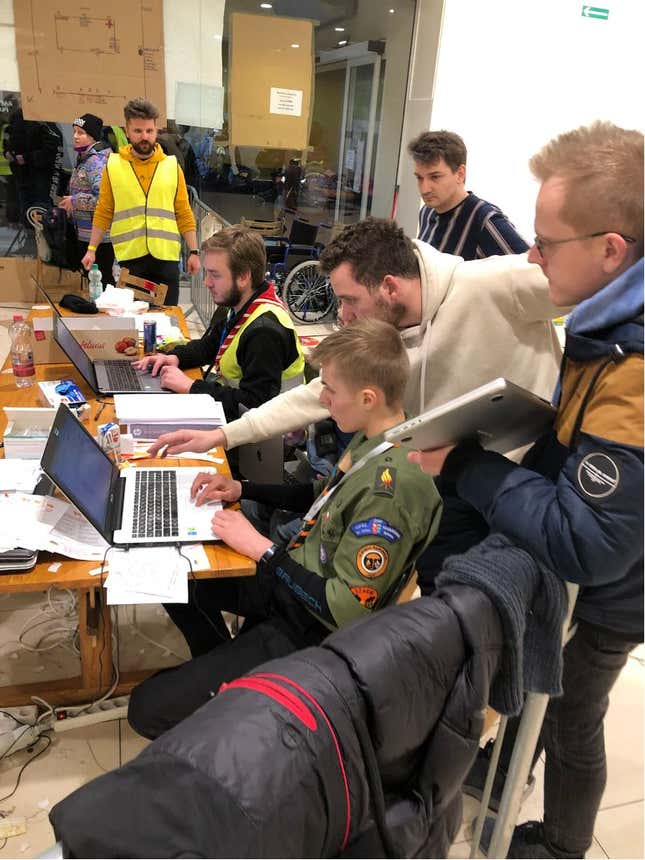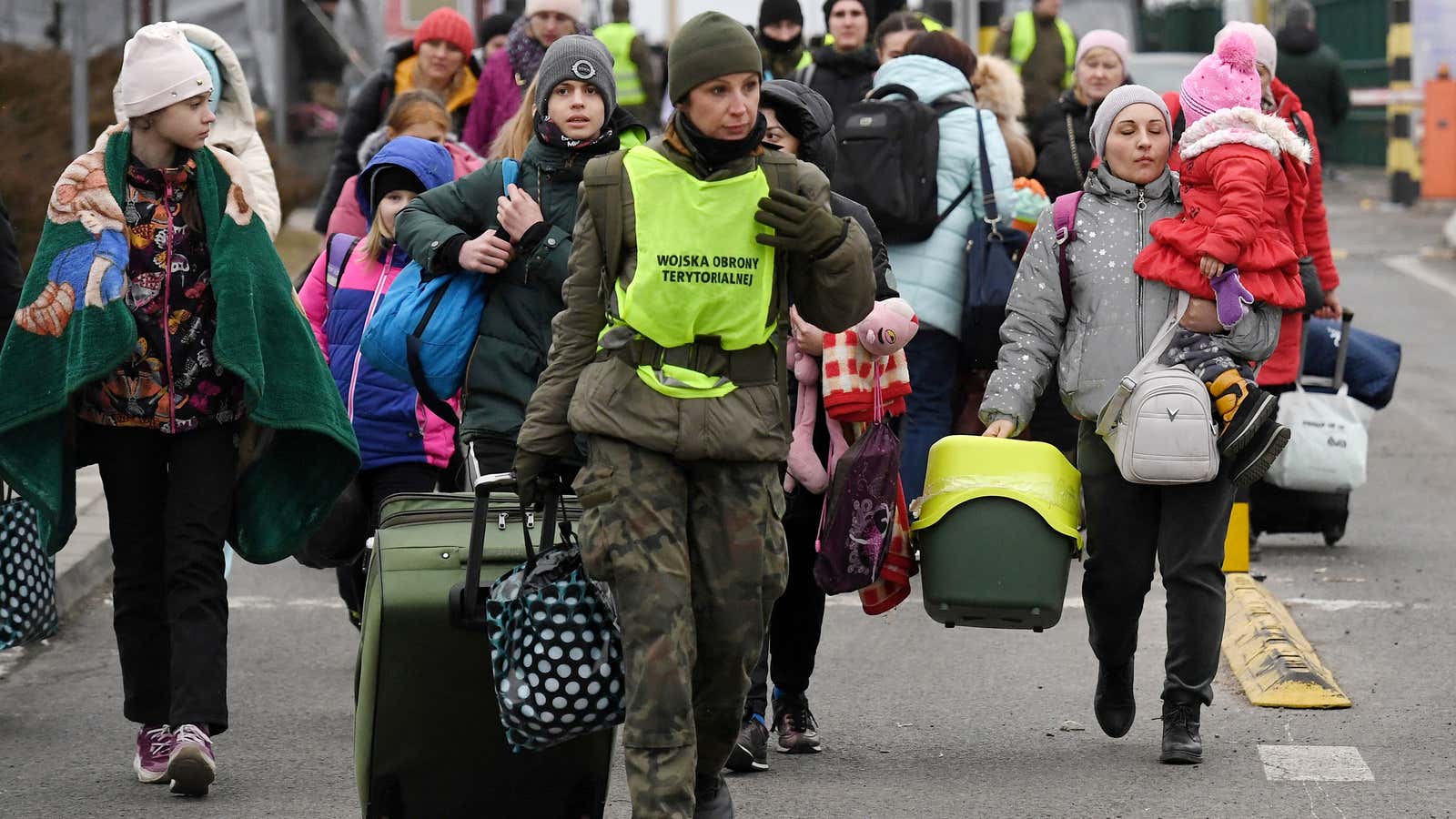Vlad Mystetskyi was among the millions of Ukrainian expats who watched in disbelief as Russia invaded Ukraine on Feb. 24.
Mystetskyi leads the product development team for monday.com, a project management app based in Tel Aviv, where he lives. Right away, he and his coworkers around the world gathered virtually to discuss what they could do for Ukraine. When the company’s social impact team decided to form a small emergency response group that would aid refugees, Mystetskyi raised his hand to volunteer. “We said, ‘OK, let’s go to Poland,’” he tells Quartz. The team didn’t know what awaited them or how they could contribute, but they knew that thousands of refugees were arriving in Poland every day.
Within days, the group had used monday.com’s software to create an online site to help refugees make safe travel plans. It has since aided more than 50,000 refugees across three camps, and may eventually be deployed to all 15 refugee sites in Poland.
“You can never be ready for this kind of thing.”
It was early March when Mystetskyi and a handful monday.com staffers arrived at a camp in Korczowa, about three miles away from the Poland-Ukraine border. It was chaos, Mystetskyi says. “We saw that there were a lot of processes going on and none of them were managed or coordinated,” he says. “I’m not even talking about not being automated. Everything was just people shouting, writing stuff on paper.”
The confusion was understandable, he says, “no one expected this huge crisis to happen. You can never be ready for this kind of thing.”
The camp was serving as a hub where people could stay for a few hours or overnight, have some meals, and figure out where to go next.
It was heartening to see compassionate people show up from around Europe saying, “I have a private car,” or “I have four places in Italy where people can stay,” says Mystetskyi, but organizers had to assume that there would be human traffickers and other criminals among the good samaritans, too. And there was no system in place to connect willing drivers with displaced Ukrainians—mostly women and children, as most men were obliged to stay in Ukraine to fight alongside its military. “There was no one who was really checking that people who are coming are real people and they don’t want to do anything bad.”

Could monday.com come up with a solution to safely connect displaced Ukrainians with legitimate drivers and places to go, and help track the pairings for safety purposes?
The team contacted companies like Uber, the ride-sharing app, and Bird, a scooter sharing company, to ask how they went about vetting drivers and customers. They were eventually put in touch with a company that automatically verifies documents and runs criminal background checks. Developers there were eager to support the project. Together, the two companies established a process for an online verification process. When successfully completed, people looking to help the refugees were issued a wristband with a special QR code, proof that they were registered. Refugees were invited to follow similar steps, so when they left the camp, there would be a record of who departed with whom and where they were headed.
The process, which monday.com’s team first established at a camp in a town called Przemysl, helped eliminate “random people” from coming into the refugee buildings, Mystetskyi says, but the software also created data that camp organizers, officials, and NGOs could use to smooth out logistical hiccups. Did they need more beds? Was it time to start sending new arrivals to other camps? Could German authorities provide more buses for trips to Berlin?
The volunteers also set up rooms within the camp that were assigned to common destinations, including Germany, Czech Republic, or Italy. “Each room had a big screen showing all the drivers who were registered and were willing to provide transportation or even accommodation in this specific region or country,” says Mystetskyi. Volunteers stood next to each of the screens to make sure people knew how to find the listed drivers.
“First, we solved the chaos problem,” says Mystetskyi, “then we made everything as coordinated as possible to give people the best experience that they can get in such circumstances.”
It took the monday.com team 24 hours to pull this together, with questions and updates flying back and forth on Slack, and coworkers in faraway offices pitching in with problem-solving.
After a few days, life at the camp became more orderly. Volunteers preparing to open a camp in the Polish city of Chelm heard about monday.com’s organizational system and asked the team to set up the same processes for them. Now the group is collaborating with relief groups in Moldova and remains in talks with Polish authorities about rolling out their software to other refugee sites.
Monday.com’s team is looking for a partner in Poland, an NGO or private company, to take over and expand its existing operations, which are still run by an ever-changing stream of volunteers.
“Even the dogs were not barking at each other”
Mystetskyi, who got back to Tel Aviv in late March, worked many 14-hour days during his three weeks in Poland.
Every now and again, the surreal nature of the crisis would strike him. “One hour you’re just looking at this mess, and thousands of women and children arriving,” and it all seemed impossible, he says. In the next hour, he’d see how much progress his team had made alongside other relief groups. That would be a “super-high” moment.
Mystetskyi was moved by the generosity shown by local residents and volunteers who brought meals and blankets to help the Ukrainians (and their pets) feel welcome. “You had enough food, it was warm, you had all the medicines that you need, and you had a lot of people who are helping you,” he says. “Volunteers wore yellow jackets and you saw a lot of them.”
If anything surprised him and his team, it was that “people were not in a panic,” Mystetskyi continues. Crowds of women and children would share a large gym with about 500 beds, he says, and “you saw kids are playing and people were feeling strong. Even the dogs were not barking at each other.”

“People felt it wasn’t time to be emotional,” he suspects. “They were in the middle of their journey. Probably, when they got to the place where they could stay, they would become much more emotional, because most of these people left their husbands and parents in Ukraine.”
Mystetskyi, too, worried about his mother in Kyiv. Before the war began, his sister had been evacuated from Ukraine by her employer, an Israeli-based company that sells website-building software. But like many Ukranians, his mother refused to leave home when she had the chance. She didn’t believe the war would land on her doorstep. She said, “Maybe the war will start, but no one will bomb Kyiv, there is no way the bombs will be near my house,” he recalls.
One day, she had to admit that the war was heading in a direction she hadn’t anticipated, he says. She joined a few people leaving Ukraine by train. By coincidence, she arrived in Przemysl, where Mystetskyi was volunteering. “There was a small McDonald’s just next to this camp and I was waiting for her there,” he recalls. “It was really cool.”
How other tech companies can help
More than a month into the war, there are still plenty of opportunities for tech workers and others to assist with what is becoming the largest scale refugee crisis in recent history. Relief agencies estimate that 10 million people from a country of 41 million are now displaced, and three million of those forced out of their homes have left the country.
“The camps are not fully organized. There is no one place that provides finance, let’s say,” he says, “or even basic things like laptops and tablets that you need for any kind of digitalization.”
Many other individuals and companies, particularly small businesses in Poland, have self-organized refugee projects as monday.com did, whether to serve meals from food trucks or offer transportation and accommodations. There are also several organizations that can help would-be volunteers find a role they can play, including:
This service matches people who are providing places to live with refugees who need temporary homes.
A small group of technology workers, Tech to the Rescue matches tech companies with vetted NGOs in need of services at scale. The organization urges companies that want to volunteer in Ukraine to touch base with groups like their own to avoid having several groups duplicate the same projects.
Join the Action, via the Polish government.
People interested in volunteering within Poland can find opportunities listed here, along with instructions for donating food, clothing, and bedding, and shelter.
Finally, several private companies which are not on the ground in refugee camps are hiring Ukrainian refugees directly for remote positions, and job boards are highlighting listings for such openings.
